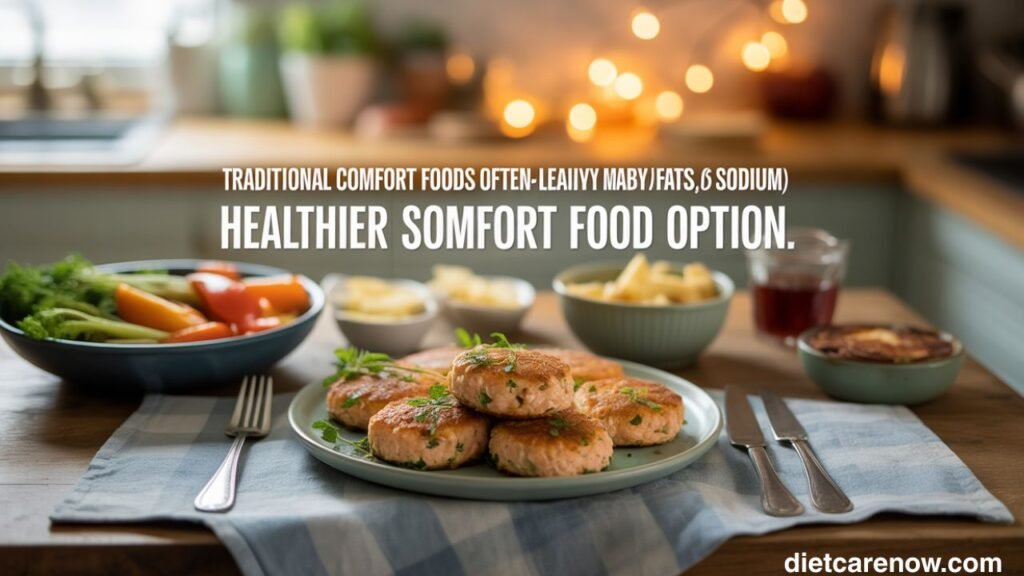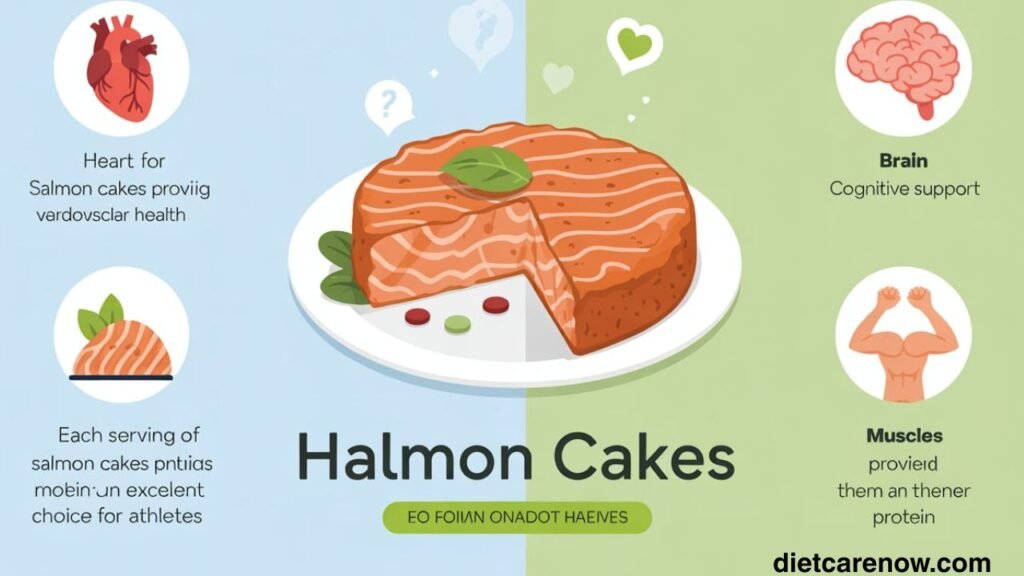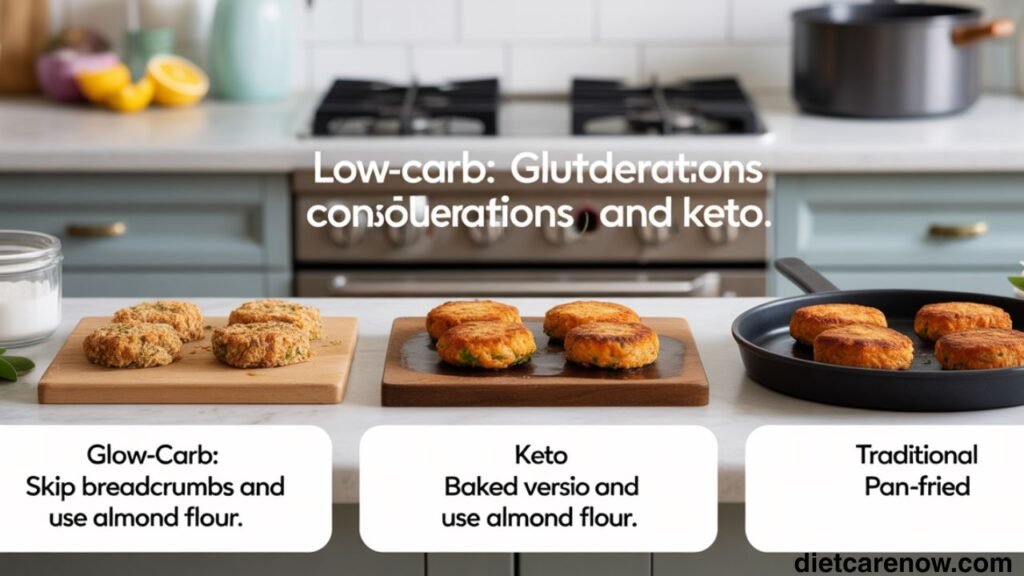Few dishes strike the balance between comfort and nutrition as well as salmon cakes. Crispy on the outside and tender inside, these patties are versatile, filling, and surprisingly nutrient-dense. Whether you enjoy them as a quick weeknight dinner, a healthy lunch option, or even a protein-packed snack, salmon cakes have carved out a loyal following across kitchens worldwide.
Salmon cakes became popular in North America and Europe as a way to stretch canned or leftover salmon into a satisfying meal. Over time, they have become a staple recipe that adapts well to different tastes, cultures, and dietary needs. Unlike many fried comfort foods, salmon cakes offer a serious nutritional advantage thanks to their star ingredient: salmon.
Why Salmon Cakes Are a Healthier Comfort Food Option
Traditional comfort foods often lean heavy on carbs, fats, and sodium, which can leave you sluggish after eating. Salmon cakes, on the other hand, deliver satisfaction without the nutritional pitfalls. They pack lean protein, omega-3 fatty acids, and key vitamins, all while being flexible enough to prepare in healthier ways.
When made with minimal fillers and baked instead of fried, salmon cakes can be part of a balanced diet that supports heart health, brain function, and long-term wellness.
Also read: /6-oz-chicken-breast/

Nutritional Value of Salmon
Before diving into the cakes themselves, it helps to understand the nutritional value of salmon.
Macronutrients
- Protein: Salmon is one of the richest sources of high-quality protein, essential for repairing muscles, supporting growth, and keeping you full longer.
- Healthy fats: Salmon provides unsaturated fats, especially omega-3 fatty acids, which play a key role in reducing inflammation and supporting cardiovascular health.
- Carbohydrates: Pure salmon is naturally carb-free, making it suitable for low-carb and keto diets.
Key Micronutrients
- Vitamin B12: Vital for red blood cell formation and nervous system health.
- Vitamin D: Supports calcium absorption and bone strength.
- Selenium: Acts as a powerful antioxidant and supports thyroid function.
- Potassium: Helps regulate blood pressure and fluid balance.
This powerful nutrient profile sets the foundation for why salmon cakes stand out nutritionally compared to other comfort foods.
Health Benefits of Salmon Cakes
Omega-3 Fatty Acids and Heart Health
Salmon cakes provide a healthy dose of omega-3 fatty acids, which are linked to lower risks of heart disease. These fats help reduce triglycerides, lower blood pressure, and keep arteries flexible.
Protein for Muscle Repair and Satiety
Each serving of salmon cakes provides significant protein, making them an excellent choice for athletes, active individuals, or anyone looking to stay fuller for longer.
Anti-Inflammatory Properties
Chronic inflammation is linked to diseases like diabetes and arthritis. The omega-3s in salmon help reduce inflammation, which may ease joint pain and improve long-term health outcomes.

Calories in Salmon Cakes
A typical salmon cake contains 200–300 calories per serving, depending on the preparation method.
Factors That Influence Calorie Content
- Cooking method: Baking or air frying uses less oil than pan-frying, lowering calorie count.
- Ingredients: Adding breadcrumbs, mayonnaise, or starchy fillers can raise calorie levels.
- Portion size: Smaller patties will naturally be lower in calories but may require pairing with vegetables or grains for balance.
Protein Power in Salmon Cakes
Protein is one of the standout nutrients in salmon cakes.
- Per serving: One medium salmon cake delivers 15–20 grams of protein, covering about one-third of the daily requirement for most adults.
- Comparison: Salmon cakes provide more protein per calorie than many snack foods like chips or crackers, making them a smart, filling choice.
Omega-3 Fatty Acids and Brain Health
Omega-3s are not just good for the heart; they also support cognitive health.
- Memory and learning: Research suggests diets rich in omega-3s improve memory and slow age-related cognitive decline.
- Mood regulation: Omega-3s have been linked to improved mood and lower rates of depression.
This makes salmon cakes an easy way to support mental wellness through diet.
Vitamins and Minerals in Salmon Cakes
Vitamin D and Bone Health
Salmon cakes provide one of the few natural food sources of vitamin D, crucial for bone strength.
Vitamin B12 for Energy and Nerve Function
B12 supports the nervous system and helps prevent fatigue. Salmon cakes provide a significant portion of your daily B12 needs.
Selenium as an Antioxidant
Selenium protects cells from damage, supports immunity, and helps regulate thyroid hormones.
Comparing Homemade vs. Store-Bought Salmon Cakes
- Homemade: Generally healthier since you control the ingredients, oil, and sodium content.
- Store-bought: Often contain preservatives, excess sodium, or fillers that dilute nutrition.
When possible, making salmon cakes at home ensures better nutritional quality.
Healthy Ingredient Substitutions
- Breadcrumb alternatives: Use whole wheat breadcrumbs, oat flour, or almond flour for added fiber and lower carbs.
- Baking vs. frying: Baking reduces fat and calorie content. Air frying is another healthier option.
- Binders: Swap mayo with Greek yogurt or mashed avocado for added nutrients.
Dietary Considerations: Low-Carb, Gluten-Free, and Keto
Salmon cakes adapt easily to different diets:
- Low-carb: Skip breadcrumbs and use almond flour.
- Gluten-free: Replace wheat-based binders with gluten-free oats or flour.
- Keto: Keep fillers minimal and bake or air fry for a high-fat, low-carb option.

Portion Sizes and Serving Suggestions
- Portion size: One to two salmon cakes (about 4 ounces of salmon per serving) makes a balanced portion.
- Pairings: Serve with roasted vegetables, fresh salads, or whole grains like quinoa or brown rice.
Common Mistakes That Reduce Nutrition
- Over-frying in oil – adds unnecessary calories and unhealthy fats.
- Using excessive breadcrumbs or fillers – lowers protein density.
- Choosing canned salmon high in sodium – opt for low-sodium versions when possible.

Salmon Cakes vs. Other Fish Cakes
- Crab cakes: Delicious but often higher in fat due to added butter or mayo.
- Tuna patties: Lower in omega-3 compared to salmon.
- Cod cakes: Lean but less nutrient-dense.
Salmon cakes stand out because they combine high-quality protein with omega-3s, vitamins, and minerals.
Who Should Eat Salmon Cakes?
- Athletes: For muscle recovery and sustained energy.
- Kids: A tasty way to get protein and healthy fats into picky eaters’ diets.
- Seniors: Supports bone strength, heart health, and brain function.
- Pregnant women: Salmon is generally safe in moderate amounts since it is low in mercury, but it’s best to choose wild-caught varieties when possible.
Conclusion: Salmon Cakes as a Nutrient-Dense Meal
Salmon cakes bring together the best of both worlds: comfort food flavor and powerhouse nutrition.
If you’re looking for a satisfying meal that doesn’t compromise on nutrition, salmon cakes deserve a permanent spot in your recipe rotation. Homemade versions will always be the healthiest choice, giving you control over ingredients while delivering comfort and nourishment in every bite.

